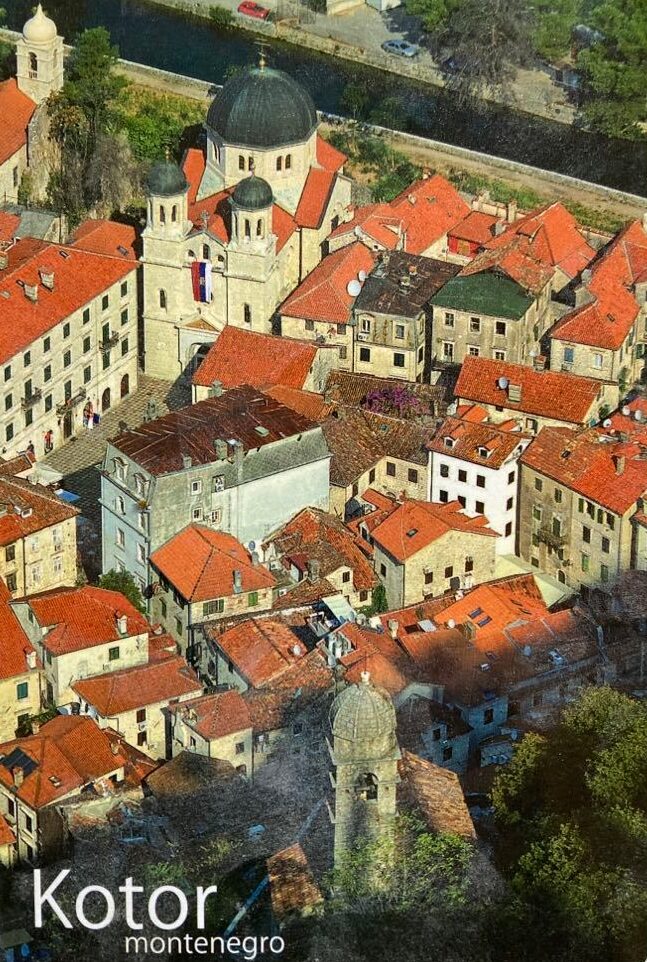Poet Tomas Venclova in the LARB: “Whatever else, now speak. There is nothing more real.”
Wednesday, August 17th, 2022
The Lithuanian poet Tomas Venclova, one of Europe’s leading poets, has been a correspondent of mine for many years – since, in fact, the Czesław Miłosz centenary celebrationsl in Kraków, 2011, where we met. I have to admit I haven’t been a very good one. Tomas comes from the era of letters – I come from the era of the Tweet. Nonetheless, I treasure him and his emails, whenever we exchange them. (I’ve written about him here and here and here, among other places.)
Sometimes I’d get a postcard or two when he was vacationing in Kotor, Montenegro, one of his favorite cities. Two of them have been pinned to my dresser mirror for ages, so I thought I’d share them with you, along with a short note about Kotor on a third.

I’ve always been eager to make Tomas Venclova better known outside Europe, so I was pleased to mediate the correspondence that brought two of his most recent poems into English and to the West, with the help of poet and translator Ellen Hinsey. They’re in the a recent edition of the Los Angeles Review of Books here.
From the introduction, written by his translator Rimas Uzgiris:
“A human rights activist and an outspoken opponent of the Soviet regime — having spent, thanks to that, almost half his life in exile — Venclova has remained a cosmopolitan humanist, a skeptical lyricist whose poetry is guardedly hopeful. He holds tight to his ethical convictions — especially the sanctity of the individual life — and to the beautiful image, the music of the line, the logic of a complexly developed thought.”
The first poem “On Both Sides of Alnas Lake,” recalls the lake where the young Czesław Miłosz used to swim. It is set in Montenegro, on the Bay of Kotor, with its Venetian fortifications dating from the 15th century).
The second poem, “Before the Fort,” also recalls Kotor:
Before the Fort
Whatever else, speak. Verse hardly holds what is pressed
Over time into the hardening clay of consciousness.
There, we find contrasts of colors and fine detail,
The ocean’s gleam, shame, wonder, and our travail.
Maybe after death. But the plane rolls down the runway.
Maybe when you won’t exist. But a sentence has no fate.
Over the horizon’s line, by the switchback — a medley
Of roofs. The citadel casts its shadow by Gurdich Gate.
Greet the scorched grasses, whose dry clumps lock up
The stretch of bay where nameless towns of stone
Age and decay. Thunderstorms slip along the strand
On the other side of the well-burnished slope.
Clouds. An untamed motorboat stirs the current alone
And from bay bottom raises Mediterranean sand.
Now, in the darkening mirror, you don’t meet you.
A lamp, a keyboard, a dictionary. That much came true.
On the windward side of storms, at Europe’s deaf edge,
Where you’ve been taken by fate or divine caprice,
You will lodge in darkness, as others have found a place
Beyond horizon’s brushstroke or the switchback’s ledge.
The keyboard flickers, a presence hovers that you but feel.
The mirror fades. Age enfetters the fatigued body alive.
You can’t begin from the start, no matter how you strive.
Whatever else, now speak. There is nothing more real.
Read the whole thing in the Los Angeles Review of Books here.



